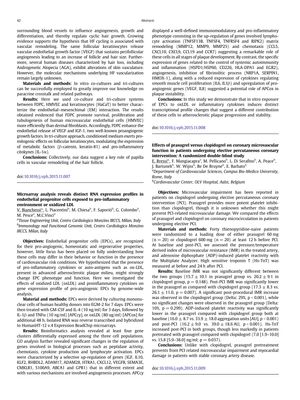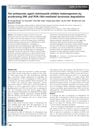Microarray Analysis Reveals Distinct RNA Expression Profiles in Endothelial Progenitor Cells Exposed to Pro-Inflammatory Environment or Oxidized LDL
December 2015
in “
Vascular Pharmacology
”

TLDR Different cells affect hair follicle blood vessels, endothelial cells react differently to inflammation and oxidized fats, and prasugrel better protects heart vessels during a procedure than clopidogrel.
The document presents three separate studies. The first study suggests that follicular dermal papilla cells (FDPC) play a key role in vascular remodeling of the hair follicle, enhancing survival, proliferation, and tubulogenesis of human microvascular endothelial cells (HMVEC) more efficiently than dermal fibroblasts. FDPC also increase the release of proangiogenic growth factors like VEGF and IGF-1, and their conditioned medium has promitogenic effects on follicular keratinocytes.
The second study demonstrates that endothelial progenitor cells (EPCs) exhibit distinct RNA expression profiles when exposed to a pro-inflammatory environment or oxidized LDL (oxLDL). The exposure to these conditions suggests a different contribution of EPCs to atherosclerotic plaque progression and stability, with oxLDL exposure leading to a potential role in plaque instability.
The third study compares the effects of prasugrel and clopidogrel on coronary microvascular function in patients undergoing elective percutaneous coronary intervention (PCI). It found that prasugrel pretreatment prevents PCI-related microvascular impairment and myocardial damage more effectively than clopidogrel. The study involved 40 patients, with 20 receiving prasugrel and 20 receiving clopidogrel. Post-PCI, the prasugrel group showed significantly lower microvascular resistance and less increase in high sensitive troponin T, indicating less myocardial damage compared to the clopidogrel group.





